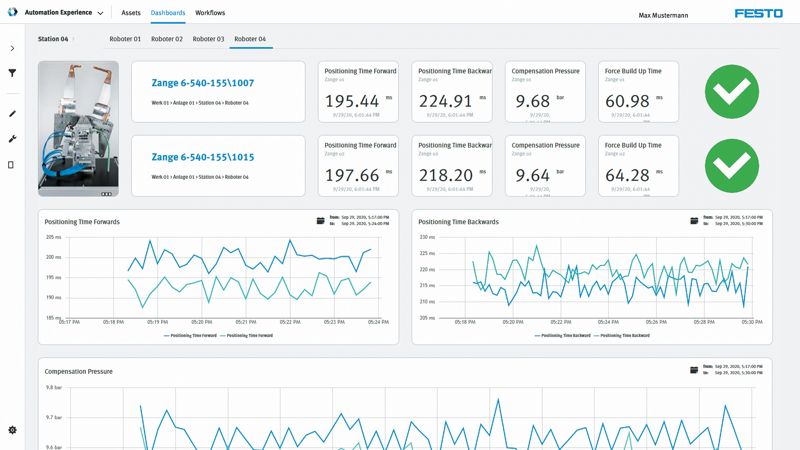Identifying waste with artificial intelligence

High energy prices, increasing cost pressure and the goal of climate-neutral production have pushed energy efficiency to the top of the agenda in many companies. Festo Energy Saving Services to DIN EN ISO 11011 offer a customised range of services to provide support with this topic.
As part of these services, energy efficiency experts from Festo work with customers and users to identify potential savings in how compressed air is used overall and reveal solutions to reduce consumption – now even with artificial intelligence.
The compressed air energy efficiency audit from Festo is the perfect starting point for customers who want to increase the energy efficiency of their complete compressed air system and reduce CO2 emissions, but who do not really know where to start. The energy efficiency experts from Festo identify weak spots and point out those measures that are most likely to pay off for the customer’s compressed air system. They make these measures available to the customer online on the Festo Energy Saving Services Portal, which provides the customer with a simple and structured way of monitoring how deficiencies such as leaks are fixed. Last but not least, it enables energy losses and CO2 emissions to be quantified.
Five-part audit
The compressed air energy efficiency audit consists of five steps. In the first three steps, the energy efficiency experts from Festo analyse the compressed air generation, compressed air preparation and compressed air distribution of the entire system. They then turn their attention to the pneumatic applications, i.e. the machines and systems themselves. They analyse the energy efficiency of these machines and systems and detect any leaks. They check whether drives, valves and tubing are optimally sized, whether blowing and vacuum applications are efficiently designed and whether installation and control concepts should be optimised. In the fifth and final step, the specialists design a concept for a compressed air monitoring system with which the energy states can be permanently monitored.
At the end of the process, the customers get a detailed report with accurately documented data and recommendations for action weighted by priority. Among other things, the documentation sets out the energy consumption and costs, power reserves and CO2 emission values that many companies need to state in their sustainability report in accordance with GRI or GHG for example.
Now with artificial intelligence and machine learning
The Festo Automation Experience, Festo AX for short, is the perfect tool for permanently monitoring the energy efficiency of a machine or system and continuously taking corrective action if deviations from the setpoint values cause energy consumption to increase. It is an easy-to-use solution that leverages artificial intelligence (AI) and machine learning to help the user extract maximum value from the data produced by the machines and systems. This not only increases productivity, but also reduces energy costs and at the same time avoids quality losses.
Predictive energy
Whether used after an audit or as a standalone measure, Festo AX provides support with all tasks related to the efficient use of energy. Continuous energy monitoring is a good and easy way of getting started. It brings ongoing transparency to the energy consumption of machine (parts), lines and plants and helps with assessing the success of the energy saving measures put in place.
Festo AX Predictive Energy provides more intelligence. Here, the production line records a “fingerprint” of the energy consumption and continuously compares it against the actual status. Thanks to the use of machine learning and artificial intelligence leaks can now be detected automatically. And without having to describe and teach in all possible fault causes beforehand. When this triggers an early reaction to a leak, it immediately lowers production costs and ensures the solution provides an early return on investment.
News release from Festo, 05/07/2022
Feel free to share
Calendar
19/11 - 22/11: Formnext, Frankfurt am Main (D)
31/03/25 - 04/04/25: Hannover Messe, Hannover (D)
15/09/25 - 19/09/25: Schweissen & Schneiden, Messe Essen (D)
08/10/25 - 15/10/25: K, Düsseldorf (D)
